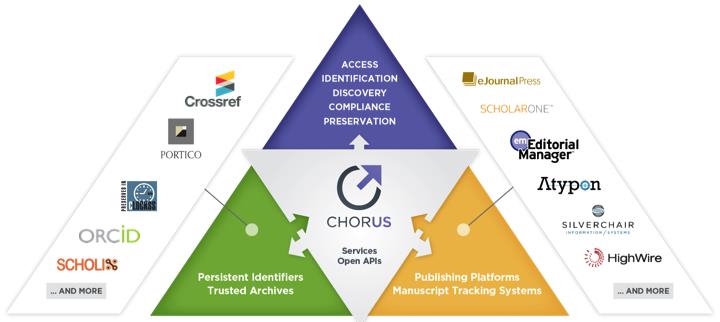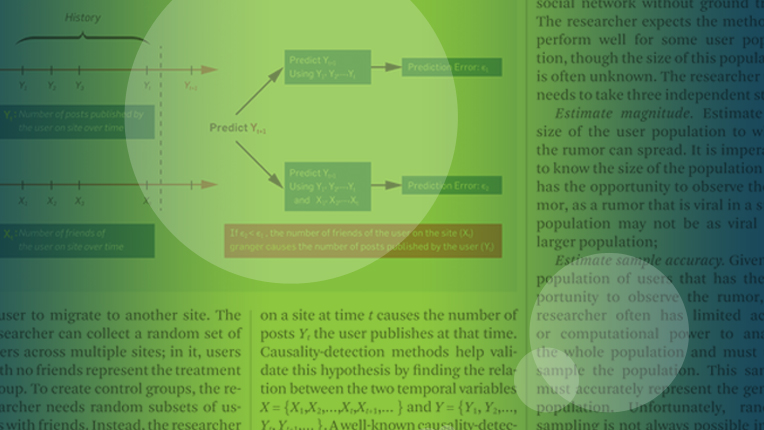CHORUS
In October 2013, a group of leading commercial and non-profit society publishers, including ACM, joined together to establish a 501(c)(3) non-profit corporation named CHOR Inc. with a mission to support and promote public access to and the continued availability of scholarly publications reporting on US federally funded research by leveraging new and existing digital technologies that are used by the publishing and scholarly communications community.
In late 2013 CHOR Inc. launched its first service called CHORUS, which stands for Clearinghouse for the Open Research of the United States, which serves as an information bridge, supporting "initially" US funding agency search portals and leveraging publishers' existing infrastructure to facilitate a simple compliance process for US federally funded research projects, optimized search and dashboard services, and multi-party archiving and preservation capabilities by leveraging and integrating various technology solutions provided by Crossref, Portico, CLOCKSS, ORCiD, and a growing list of international publishing technology service providers, including Atypon, Clarivate, Aries, Highwire, SilverChair, eJournal Press, Cenveo, and others.
Expansion Beyond United States Federal Funding Agencies
Over the past year, CHORUS has started to expand its services beyond the United States and US Federal Funders, and is currently working with several international funders of computing research, including the Japan Science and Technology Agency and the Australian Research Council, as well as a growing list of US and international academic institutions.
The longterm vision of the organization is to serve as a bridge between funders, researchers, research institutions, and publishers to ensure the public accessibility of scholarly research publications after an initial embargo period and to provide a range of services to these stakeholders.
CHORUS is currently monitoring over 400,000 articles from its approximately 50 member publishers with over 100,000 articles committed by Publishers be being made publicly accessible on the publishers' websites.
How the Service Works

To initiate CHORUS' services, authors simply have to identify their funding sources when submitting a paper for publication with a participating publisher. That action tags the article with the Crossref OpenFunder Registry service, triggering free public access of the best available version (either the final, published version or the author's accepted manuscript), either immediately on publication or after a designated embargo period.
The data that results from the tagging and subsequent public access is collected by Crossref and provided by CHORUS to all at no cost through an open Application Programming Interface (API); this can be used by anyone to create new and customize available search and analytic tools. Applications to optimize search and enable funders to track and ensure compliance and analyze funding impact have already been developed by CHORUS and are available to participating agencies. CHORUS also partners with CLOCKSS and Portico to ensure the archiving and preservation of research papers.
CHORUS' streamlined and cost-effective approach delivers value to funders, publishers, researchers, institutions, and the public at each point in the process of enabling public access:
- IDENTIFICATION: Simply naming the funding source during the article submission process adds metadata from the Crossref Open Funder Registry, which triggers public access to the article and minimizes the time researchers have to spend on administrative tasks.
- DISCOVERY: Users can quickly find the latest research articles via agency portals and common search engines, as well as through CHORUS' optimized search application. CHORUS' open programming and interface invites innovators to develop new tools and functionality that further support public access and facilitates text and data mining on articles reporting on funded research.
- ACCESS: CHORUS points users to the best available version of articles - either immediately on publication or after an embargo period - on the publication sites, where they can find essential context, tools, and information.
- COMPLIANCE: Compliance is easy using simple tagging built into the article submission process, while a CHORUS Dashboard application facilitates monitoring and reporting by funders and publishers without adding unnecessary costs and administrative overhead.
- PRESERVATION: CHORUS ensures the integrity and sustainability of the scholarly record through partnerships with CLOCKSS, Portico, and other services that archive and preserve research articles in perpetuity.
CHORUS Services
CHORUS currently offers two basic services for authors, funders, institutions, and publishers as follows:
SEARCH SERVICE
The search service enables users to discover articles reporting on funded research from our publisher members. Learn more about our Search Service. The following link provides information about ACM published articles that are monitored by CHORUS and reported to the funding agencies and funders working with CHORUS. To use the search service, please click here.
DASHBOARD SERVICE
The dashboard service enables funders, institutions, researchers, publishers, and the public to keep track of public-access compliance by our publisher members. Learn more about our Dashboard Service. For more information about how Institutions can take advantage of the CHORUS Service, please see here. To use the dashboard service, please click here.
CHORUS Participating Funding Agencies
The following is a list of funders currently working with CHORUS:
- National Science Foundation (NSF)
- Department of Defense (DOD)
- Department of Energy (DOE)
- Department of the Interior (DOI) - USGS
- Japan Science & Technology Agency (JST)
- Office of the Department of National Intelligence (ODNI) - IARPA
- Smithsonian Institution (SI)
- US Department of Agriculture (USDA)
- National Institute of Standards and Technology (NIST)
- Australian Research Council (ARC)
For more information about CHORUS and ACM's role with CHORUS, please contact ACM.
Publish with ACM
ACM's prestigious conferences and journals seek top-quality papers in all areas of computing and IT. It is now easier than ever to find the most appropriate venue for your research and publish with ACM.

ACM Case Studies
Written by leading domain experts for software engineers, ACM Case Studies provide an in-depth look at how software teams overcome specific challenges by implementing new technologies, adopting new practices, or a combination of both. Often through first-hand accounts, these pieces explore what the challenges were, the tools and techniques that were used to combat them, and the solution that was achieved.

